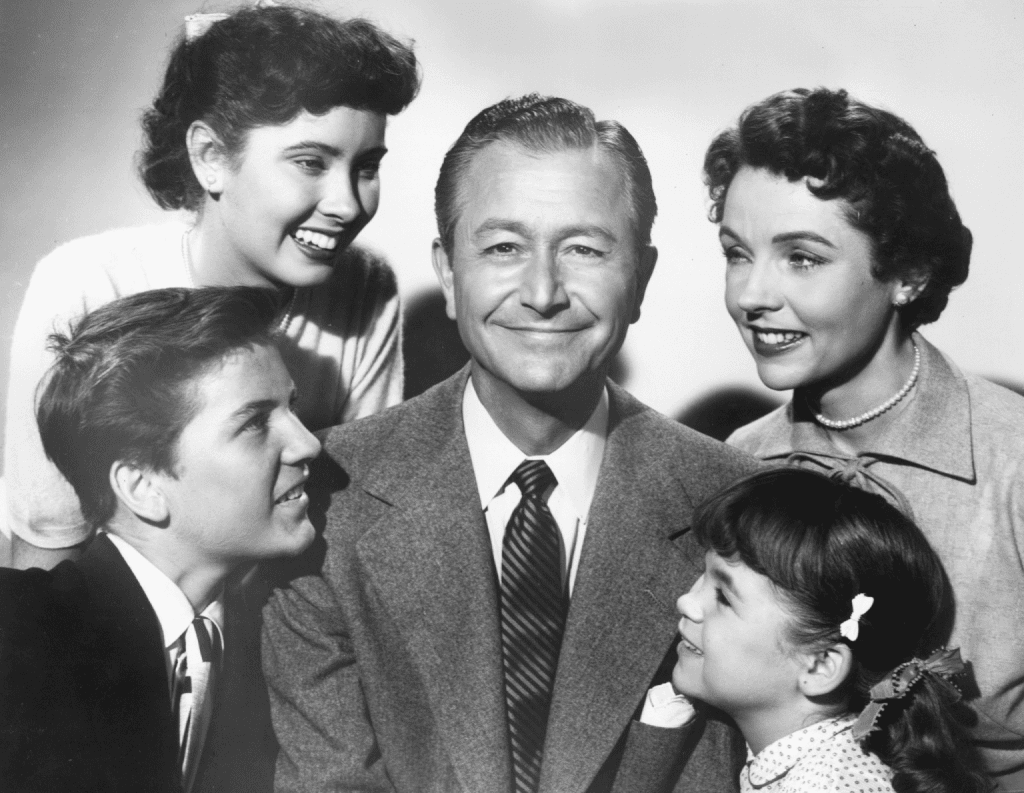This scene is completely unedited—be prepared for a twist, can you see it coming
Father Knows Best remains a shining example of television that captured the heart of America during the 1950s and 1960s. Featuring the Anderson family and their idealized portrayal of middle-class life in the fictional town of Springfield, the show offered a comforting escape and a model of strong family values. With Robert Young, Jane Wyatt, Elinor Donahue, Billy Gray, and Lauren Chapin leading the cast, the sitcom ran for six seasons, spanning 203 episodes, and continues to hold a nostalgic place in the hearts of many.

The Beginnings of a Beloved Show
The roots of Father Knows Best trace back to radio, where it debuted in 1949. Created by Ed James, the show quickly garnered attention for its humorous take on family dynamics. In 1954, the series made the leap to television, premiering on CBS with sponsorship from Kent cigarettes. Though it initially faced cancellation after one season, NBC picked it up, where it thrived for three additional seasons before returning to CBS in 1958.
Over its six-year run, Father Knows Best found its stride as a prime-time favorite, charming audiences with its blend of humor, warmth, and relatable storytelling.
A Reflection of American Family Life
At its core, Father Knows Best was about family. The Andersons—headed by wise and thoughtful Jim (Robert Young) and the ever-calm Margaret (Jane Wyatt)—embodied the values of honesty, integrity, and compassion. Their three children, Betty (Elinor Donahue), Bud (Billy Gray), and Kathy (Lauren Chapin), each brought unique challenges and comedic moments, reflecting the ups and downs of family life.
Set in the Midwest, the show painted a picture of the ideal American household. Jim Anderson wasn’t just a father; he was a moral compass, a problem solver, and a gentle guide for his family. Margaret provided the emotional backbone, balancing the humor and lessons with grace and understanding. Together, they created a home that resonated with audiences as both aspirational and familiar.
The Cultural Impact of Father Knows Best
The influence of Father Knows Best extended far beyond the small screen. The Andersons became cultural role models during an era when television was shaping societal values. In 1959, the U.S. Treasury Department even produced a special episode titled “24 Hours in Tyrant Land” to promote savings bonds. Although it never aired on television, the episode was distributed to schools and civic organizations, underscoring the Anderson family’s role as paragons of good citizenship.
The series’ lasting appeal led to two reunion movies in 1977: Father Knows Best Reunion and Father Knows Best: Home for Christmas. These films revisited the Andersons as they navigated new phases in life, with Betty now a widowed mother, Bud a family man, and Kathy engaged to a doctor. These storylines highlighted the enduring values of love and resilience that defined the original series.

The Iconic Anderson Family Home
The Andersons’ home, with its cozy charm and welcoming atmosphere, became a visual symbol of 1950s family life. The house’s façade was so iconic that it was later repurposed for other classic shows like Dennis the Menace, I Dream of Jeannie, and Bewitched. This familiar setting contributed to the timeless appeal of Father Knows Best, making it instantly recognizable to generations of television viewers.
Why Father Knows Best Still Resonates Today
Despite its idealized depiction of family life, Father Knows Best continues to captivate audiences for its heartfelt storytelling and universal themes. The show served as a reminder of the importance of kindness, understanding, and strong familial bonds during a period of rapid social change.
The series also offered a blueprint for many family sitcoms that followed, from Leave It to Beaver to The Brady Bunch. Its balance of humor and life lessons laid the groundwork for television that entertained while also imparting values.
For viewers today, Father Knows Best is more than just a nostalgic trip down memory lane—it’s a celebration of timeless virtues and the enduring power of family.

The Legacy of Father Knows Best
Though its final episode aired on May 23, 1960, Father Knows Best left an indelible mark on television history. Its themes of love, respect, and togetherness continue to resonate with audiences of all ages. Whether through reruns, reunion specials, or its influence on modern sitcoms, the series remains a beloved piece of Americana.
In a world that often feels fast-paced and chaotic, Father Knows Best reminds us of the importance of slowing down, cherishing our loved ones, and finding joy in the everyday moments. It’s no wonder the show still holds a special place in the hearts of so many.


